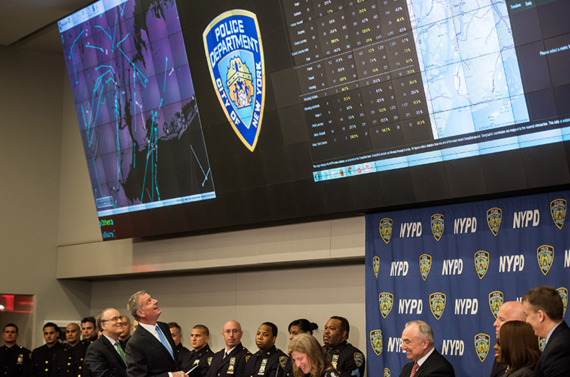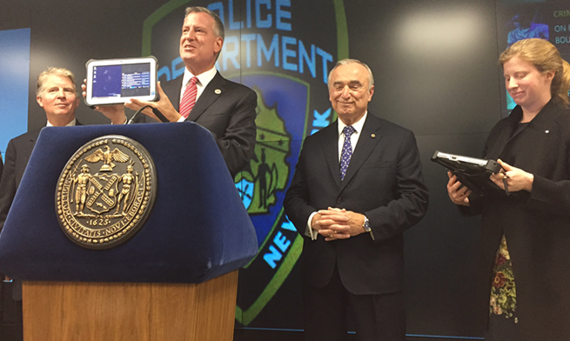For those familiar with the ticking time bomb scenario, the sidestepping of human rights or civil liberties often work best when rushed. There's someone with information about an imminent terrorist attack so we have to torture the details out of them, goes the thinking. Law enforcement officials have harnessed that type of urgency in the federal government's highly visible battle over smartphone access with tech giant Apple, who this week won a legal victory in court. But as federal authorities continue to try to coax the company into compliance, local police are angling for their stake in the battle, which will affect their ability to surveil the population and even predict crime.
Fresh off of a fiery press conference alongside New York Senator Chuck Schumer, where they railed against the White House for cuts to a special anti-terrorism grant, NYPD commissioner Bill Bratton took time from his schedule to co-author an op-ed in The New York Times that invoked the deaths of 14 shooting victims in California last year. Bratton and longtime media personality John Miller, now heading the NYPD's counterterrorism efforts, argued that law enforcement needs access to Americans' phones to "stop the next terrorist attack." It was Bratton who suggested the assailants in last year's terrorist attacks in Paris used encryption technology on their phones to escape surveillance, although that has yet to be proven.
While it may seem strange to have a multinational corporation ostensibly defending Americans against improper searches from the government, stranger yet is that police, smack dab at the heart of a national conversation on civil rights and black lives, want to be at the forefront of a debate on civil liberties.
Bratton, ever outspoken, has chosen to carve out a significant role in this fight using his platform as head of the country's largest police force. A master of the revolving door between the business world and government, Bratton, who has sat on the board for numerous companies (including Motorola, which offers encryption technology), has been a close ally and admirer of corporate America. Forced to bash Apple now, Bratton has looked to the business world to help shape what he sees as the future for police: predictive policing.
In a 2008 Oxford University paper alluding to the next stage for CompStat, the police management system he famously implemented in the 1990s, Bratton marveled at a private sector that had much to teach police departments. The next level in CompStat was centered around police departments' "collaborative efforts with our academic and business communities in order to continually improve our ability to forecast crime", he wrote.
Last week Bratton unveiled CompStat 2.0, a new interactive crime map made available to the public. More data. More technology. A modern strategy for the modern world, it would appear. But this type of crime-mapping prowess, added to the NYPD's already formidable intelligence gathering capacity, like its powerful Domain Awareness System, is a sign that predictive policing is already upon us. Not only will mobile fingerprinting allow cops to more easily collect our data, but predictive algorithms will made available through new department-issued smartphones.
Bratton already boasts that he can track New Yorkers through their phones and GPS systems but the ominous and Orwellian implications that having police predict where crimes will happen demands an unreasonable amount of trust in the police and their methods -- and has rarely been discussed or explained to the public.
When Bratton, Schumer and Manhattan District Attorney Cyrus Vance demand a steady stream anti-terror funds, it comes from the same big brother mentality that wants unfettered access to our phones and is yearning to predict crime. And this is a group effort, to be sure: Vance has provided the funding for the tablets and smartphones that will be issued to every cop and police vehicle, 41,ooo in total, in part to ensure that police prediction flows from police plaza down to every beat cop. Ironically, the money comes in the form of asset forfeiture funds obtained from a French bank penalized for doing business with the Iranian government -- a direct result of White House sanctions and foreign policy that Senator Schumer quibbled about with the Obama administration.
In the minds of law enforcement, the post-9/11 ticking time bomb will never stop ticking. Now police have tasked themselves with predicting crime. Both strains of thought are connected in that predictive policing was born out of research conducted by US Army researchers looking to predict the next overseas insurgency. This all screams of a national security state and police state, which are perhaps one in the same. Seeing a police commissioner pound the table for more access is perhaps not surprising but is deeply rooted in a vision for America that wants law enforcement to know all and see all. It has less to do with terrorism than it has to do with control -- an amount of control we cannot afford to give to police.


